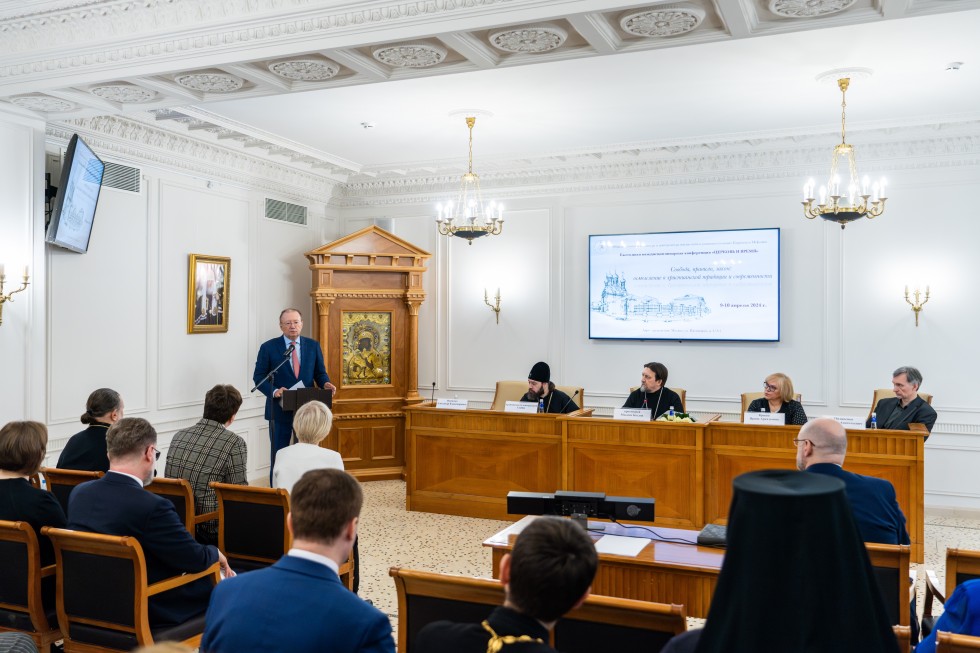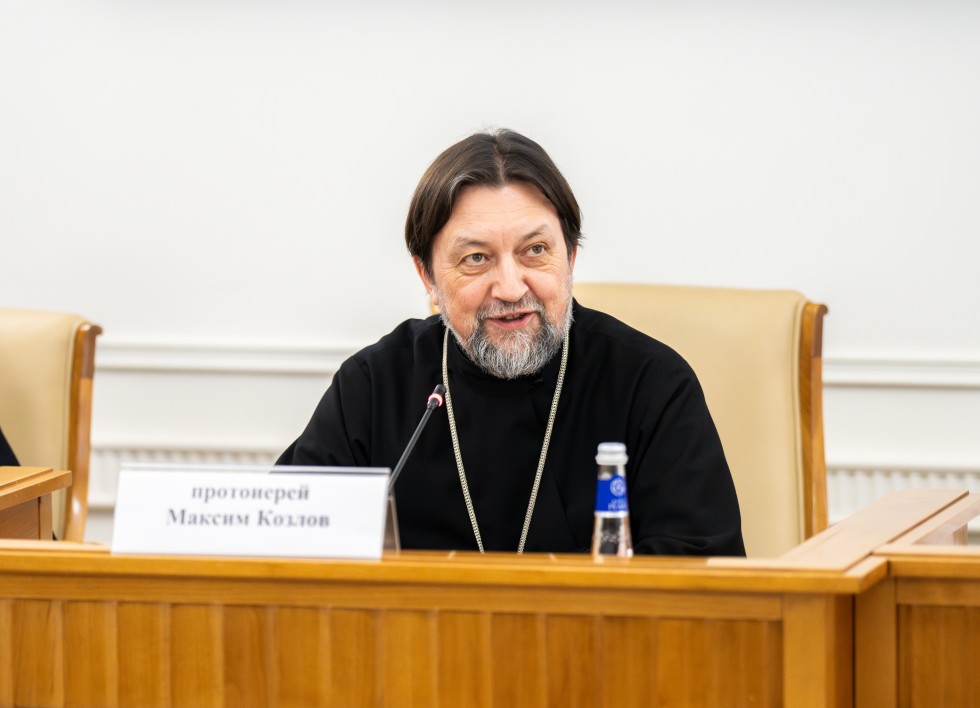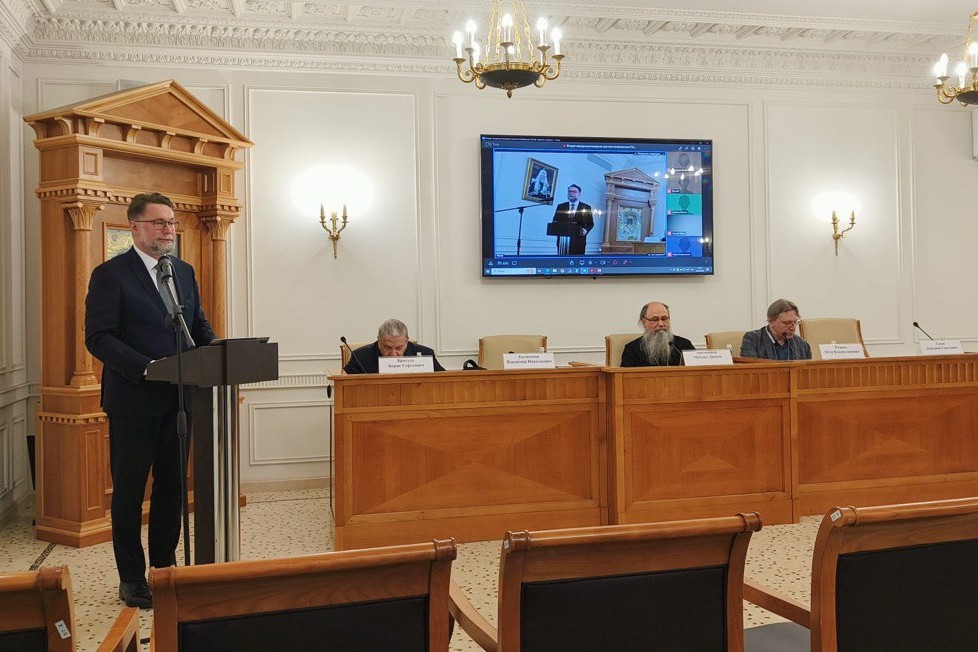Freedom and Law in the Christian Tradition — the Topic of the “Church and Time” Conference at the Saints Cyril and Methodius Institute for Postgraduate Studies

On 9-10 April, 2024, the 2nd annual interdisciplinary “Church and Time” Conference was held at the Saints Cyril and Methodius Institute for Postgraduate Studies. The topic of this year’s conference was “Freedom, Rule and Law: Making Sense of these in Christian Tradition and in Modern Times”.
The forum, which was held in celebration of the Institute’s 15th anniversary, was opened by its Rector, Fr Maksim Kozlov, a professor who is also Chairman of the Education Committee of the ROC.

Participants’ presentations, which were heard over two days, related to issues in Theology and Biblical Studies, various aspects of patristic and philosophical thought, historical and practical ecclesial questions, as well as issues relating to church art.
First Vice Rector Dmitry Gasak represented SFI at the conference, and presented a paper entitled “Early Slavophile thought in Aleksej Khomjakov and Ivan Kireevksij on the Significance of Freedom and Authority in Solving the Problem of Church Unity”.

Dmitry Gasak noted that to understand Khomjakov’s and Kirevskij’s thought one must understand that it expresses faith in the Church much more than their mental picture of church organization. “For the Slavophiles, the church is primarily unity,” he underscored. It is specifically a New Testament understanding of unity that unfolds in the teaching of Ivan Kireevskij, and our developed understanding of the sobornal character of the Church is a direct result of confession of the Church as a unity.”
Inside this logic, everything that is authentically ecclesial serves in the building of Church, whereas sin within the church primarily manifests as destruction of her unity. “In one way, we can discern good and evil in light of New Testament revelation as that which acts either to build Church unity or to tear it down,” said Gasak.
His paper also considered Khomjakov’s and Kireevskij’s understandings of one very particular aspect of church unity — the inter-relationship between church and monarchy in Russia. Gasak paid specific attention to three works: 1) an article by Khomjakov entitled “Some Orthodox Christian Thought on Western Confessions in Relation to Mr Laurencie’s Brochure”; 2) “On the Relationship of the Russian People to Tsarist Power”, by Ivan Kireevskij, and 3) Kireevskij’s letter to Aleksandr Koshelev, dated 15 October, 1853.
An interesting aspect of these early Slavophile’s approach to considering issues of the people’s attitude toward tsarist power and between Church and monarch, is that their starting “subject matter” is a specific individual who is a believing member of the Church, i.e. a Christian tied to other people within society and also to the monarch himself. They look not only at individual members of the educated class in considering these questions, but also at simple members of the public.
Conference participants included:
- Bishop Kirill (Zinkovskij) of Sergeev Posad and Dmitrov — Rector of the Moscow Ecclesiastical Academy;
- Bishop Siluan (Nikitin) of Peterhof — Rector of the St. Petersburg Ecclesiastical Academy;
- Metropolitan Isidor (Tupikin) of Smolensk and Dorogobuzh — Rector of the Orthodox seminary in Smolensk;
- Fr Konstantin Reva — Vice Rector for scholarly and methodological work at the Orthodox seminary in Voronezh;
- Mikhail Shkarovskij — Chief archivist at the Central State Archive in St. Petersburg and a professor at the Institute of Postgraduate Studies and at the Ecclesiastical Academy in St. Petersburg;
- Monsignor Francesco Braschi — Vice Prefect and Doctor of the Ambrosian Library, a professor at the Milan Catholic University of the Sacred Heart and at the Institute of Postgraduate Studies and the Moscow Ecclesiastical Academy;
- Aleksej Fokin — a leading scholar at the Institute of Philosophy of the Russian Academy of Sciences;
- Pyotr Rezvykh — a senior lecturer the National Research University Higher School of Economics;
- Vladimir Katasonov — correspondent member of the Russian Academy of Natural Sciences and professor at the Institute of Postgraduate Studies;
- Aleksej Varlamov — Rector of the Gorky Institute for Literature;
- Fr Antonij Borisov — a senior lecturer at the Institute of Postgraduate Studies and the Moscow Ecclesiastical Academy;
- Various other representatives of church and secular humanitarian institutions of learning.
